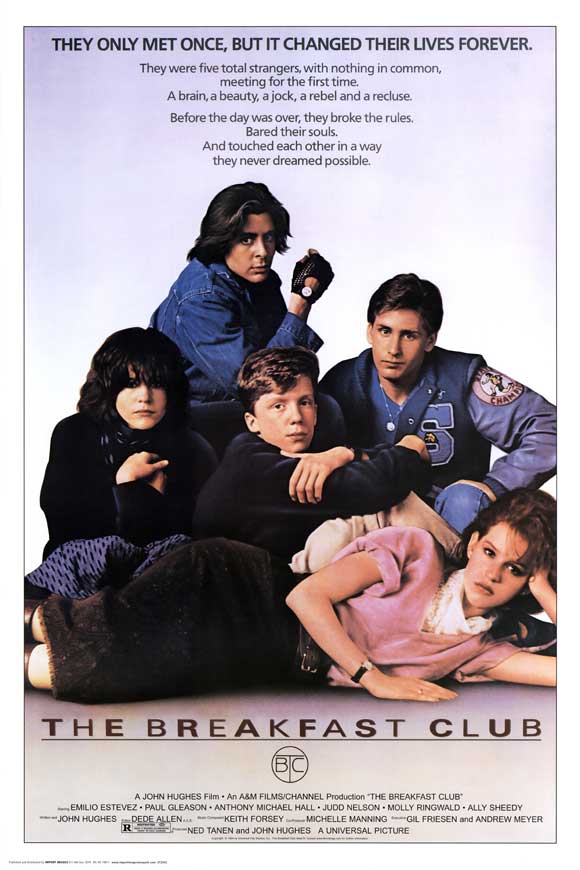
~ archived since 2018 ~

Which character in “The Breakfast Club” did you resemble the most as a tenth grader? The answer often predicts adult personality:
In 2000, three psychologists presented a paper titled âPeer Crowd-Based Identities and Adjustment: Pathways of Jocks, Princesses, Brains, Basket-Cases, and Criminals,â which asked a large sample of tenth-graders which of the five characters from The Breakfast Club they most considered themselves to be, and then checked back in with them at 24. The categories were âimmensely predictive,â according to Jacquelynne Eccles, one of the authors.Â
This is from a long, fascinating article in New York Magazine called “Why You Never Truly Leave High School.” It references a number of interesting social science studies showing how profoundly that time of life can shape you, damage you and predict who you will be. Some other highlights are below.
Height, weight and attractiveness during high school predict success as an adult better than those factors in general:
…it wasnât adult height that seemed to affect their subjectsâ wages; it was their height at 16. (In other words, two white men measuring five-foot-eleven can have very different earning potential in the same profession, all other demographic markers being equal, just because one of them was shorter at 16.) Eight years later, Deborah Carr, a sociologist at Rutgers, observed something similar about adults of a normal weight: They are far more likely to have higher self-esteem if they were a normal weight, rather than overweight or obese, in late adolescence (Carr was using sample data that tracked weight at age 21, but she notes that heavy 21-year-olds were also likely to be heavy in high school). Robert Crosnoe, a University of Texas sociologist, will be publishing a monograph with a colleague this year that shows attractiveness in high school has lingering effects, too, even fifteen years later. âIt predicted a greater likelihood of marrying,â says Crosnoe, âbetter earning potential, better mental health.â
High school is a very recent phenomenon:
Until the Great Depression, the majority of American adolescents didnât even graduate from high school. Once kids hit their teen years, they did a variety of things: farmed, helped run the home, earned a regular wage… In their recent book Escaping the Endless Adolescence, psychologists Joseph and Claudia Worrell Allen note that teenagers today spend just 16 hours per week interacting with adults and 60 with their cohort. One century ago, it was almost exactly the reverse.
When asked, many popular kids didn’t see themselves as popular. Why? Because staying popular requires so much effort you never really feel you’ve achieved it:
âItâs social combat,â he explains. âThink about it: Thereâs not much instrumental value to gossiping about a wallflower. Thereâs value to gossiping about your rivals.â The higher kids climb, in other words, the more precariously balanced they feel, unless theyâre standing on the square head of the totem pole. It therefore stands to reason that many popular kids donât see themselves as popular, or at least feel less powerful than they loom. Their perch is too fragile.
One of the reasons high school can be so painful to some is because few relationships are two-way:
In 2005, the sociologist Koji Ueno looked at one of the largest samples of adolescents in the United States, and found that only 37 percent of their friendships were reciprocalâmeaning that when respondents were asked to name their closest friends, the results were mutual only 37 percent of the time. One could argue that this heartbreaking statistic is just further proof that high school is a time of unrequited longings.
Why is it a liability to be smart in high school? Because it can be a social liability to be smart in life:
Kurt Vonnegut wrote that high school âis closer to the core of the American experience than anything else I can think of.â …Why is it that in most public high schools across America, a girl who plays the cello or a boy who plays in the marching band is a loser? And even more fundamentally: Why was it such a liability to be smart? The explanations tended to vary. But among the most striking was the one offered by Steinberg, who conjectured that high-school values arenât all that different from adult values. Most adults donât like cello or marching bands, either. Most Americans are suspicious of intellectuals. Cellists, trumpet players, and geeks may find their homes somewhere in the adult world, and even status and esteem. But only in places that draw their own kind.
And how good you are at navigating high school might predict how good you are at navigating life:
Thirty-five years later, the authors estimated, boys who ranked in the 80th percentile of popularity earned, on average, 10 percent more than those in the 20th…Â Joseph Allen and his colleagues at the University of Virginia just found that kids who suffer from mild depression at 14, 15, and 16 have worse odds in the futureâin romance, friendship, competency assessments by outsidersâeven if their depression disappears and they become perfectly happy adults. âBecause thatâs their first template for adult interaction,â says Allen when asked to offer an explanation. âAnd once theyâre impaired socially, it carries forward.â
TheRedArchive is an archive of Red Pill content, including various subreddits and blogs. This post has been archived from the blog bakadesuyo.
| Title | Which character in “The Breakfast Club” were you in high school? (It can predict who you’ll be as an adult.) |
|---|---|
| Author | Eric Barker |
| Date | January 23, 2013 1:19 PM UTC (11 years ago) |
| Blog | bakadesuyo |
| Archive Link |
https://theredarchive.com/blog/bakadesuyo/which-character-in-the-breakfast-club-were-you-in.13583 https://theredarchive.com/blog/13583 |
| Original Link | https://www.bakadesuyo.com/2013/01/breakfast-club/ |

© TheRedArchive 2024. All rights reserved.
created by /u/dream-hunter